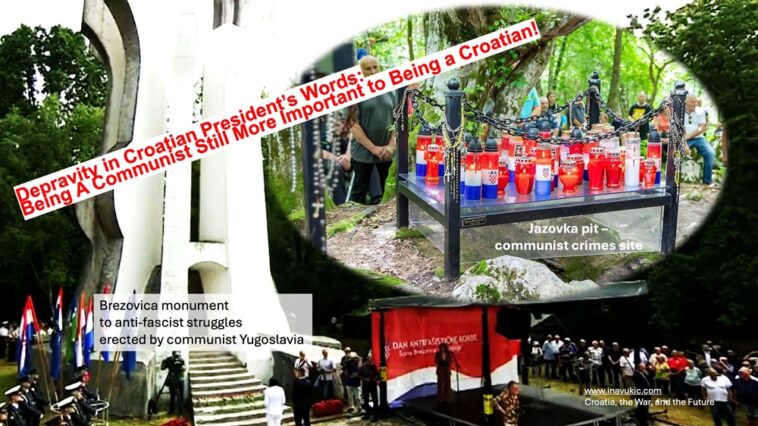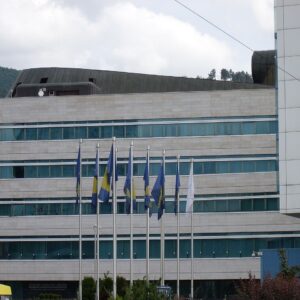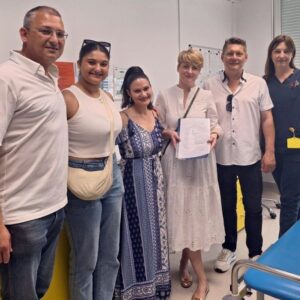Author: Ina Vukić
The Croatian independence referendum in May 1991 was held at 7,691 polling stations, where voters were given two ballots—blue and red, with a single referendum option each, allowing use of either or both of ballots. The referendum question proposing independence of Croatia, presented on the blue ballot, passed with 93.24% in favour, 4.15% against, and 1.18% of invalid or blank votes. The second referendum question, proposing that Croatia should remain in Yugoslavia, was declined with 5.38% votes in favour, 92.18% against and 2.07% of invalid votes. The high voter turnout was 83.56%.
Croatia subsequently declared independence and dissolved its association with Yugoslavia on 25 June 1991 after which the Yugoslav Peoples’ Army and Rebel Serb forces in Croatia intensified their brutal aggression and war against an independent Croatia. Ethnic cleansing of Croatians and other non-Serbs from about 25% of Croatian territory intensified.
The will of the Croatian people to exit from the communist totalitarian regime was, therefore, overwhelming and absolute.
In 2024 Croatia has a President who promotes “being a communist” as more valuable than “being a Croat”! That sorry excuse for a President of Croatia that exited and rejected communism, Zoran Milanovic, said in Brezovica, Croatia, on 22 June 2024 at the ceremony celebrating the so-called World War Two Anti-Fascist Struggles in Croatia as part of the then intended communist Yugoslavia: “They were freedom fighters, and they were communists. And that is their very important characteristic, a strain of people that we cannot understand today. And all these Croatian champions and greats whose names were mentioned here for a reason, they were first of all communists, internationalists, and then Croats, and that matured in them.”
In Croatia, the Day of Anti-Fascist Struggle is June 22, the day that remembers and honours the first partisan (communist) detachment and the first so-called anti-fascist unit in this part of Europe was founded 83 years ago in the forest of Brezovica near the small town of Sisak. Since 2002, Croatia has commemorated June 22 as Anti-Fascist Resistance Day, a national holiday established by the Law on Holidays, Memorial Days, and Non-Working Days.
This day being a public holiday appears extremely important in Croatian history fed to the world by its communists, or rather, former Yugoslavia communist operatives sill occupying high positions of power in Croatia. The Sisak Detachment and its members decided to fight against what they called evil (Nazi Germany and Italian fascist occupiers and their war-time allies). And yet, as the cruel history would unfold, this detachment itself was the start of untold evil and oppression against Croatian patriots by the unfolding communist Yugoslavia regime and all of its detachments.
And so, if this day is extremely important for Croatian history it is not for reasons of praising the so-called liberating Croatia/Yugoslavia from Nazi Germany and Italian occupiers’ activities but because it reminds the world of the genocide against Croatian patriots this Sisak detachment and its subsequent communist kin committed. This day attempts to tell the world that these communists who, undeservingly, called themselves anti-fascists were the good guys in World War Two Croatia and the others, those that were against a communist Yugoslavia, any Yugoslavia, and wanted an independent Croatia were the bad guys! We are well into the 21st century and 33 years since Croatia declared its latest independence from communist Yugoslavia and yet Croatia it seems is still fighting to justify the unjustifiable – the cold murder of hundreds of thousands anti-communist Croats and the filling of pits and hundreds of mass graves with their remains across the entire country.
The 2024 celebration of the Day of Anti-Fascist Struggle at Brezovica was also attended by Croatian Minister of Foreign and European Affairs Gordan Grlic Radman, Mayor of Zagreb Tomislav Tomasevic, former President of Croatia Stjepan Mesic and President of the Association of Anti-Fascist Fighters and Anti-Fascists of the Republic of Croatia Franjo Habulin. The representative of the Prime Minister Andrej Plenkovic, Minister of Foreign and European Affairs Goran Grlic Radman at the event reminded everyone as to who it was that stood up against Nazism and fascism, criminal ideologies, pointing out that the anti-fascist movement was the strongest in Croatia and that the First Sisak Partisan Squad had the greatest credit for it.
Hm, it appears evident that the criminal aspect of the communist partisan squads or detachments has also eluded this government minister, not only the resident of the country! One may speculate as to whether that is purposefully so or out of sheer ignorance about the history of deadly peril Croatian patriots suffered under partisans and communist forces. One can safely so that it is the former.
With the President and members of the government cabinet dishing out public speeches of this calibre it would seem that unless drastic and urgent measures are undertaken Croatia will officially criminalise the May 1991 independence referendum for exit from communist Yugoslavia and the will of its people. Not to mention the Homeland War of 1990’s Croatian defence forces.
With such a calibre of the country’s president the values of the Homeland War and the independence referendum need no other enemies. What a shocking picture today for what was supposed to be Croatia that left communist Yugoslavia well and truly behind! In rivers of own blood! Communist Yugoslavia symbols have not yet been banned. Croatia still does not have national legislation on denial of crimes which explicitly refer to the denial of crimes by totalitarian communist regime as, for example other former communist countries do such as Poland and Czech Republic. And events or celebrations as those that have just occurred on 22 June for Anti-Fascist Struggles suggest to us that communist crimes and their victims will, regretfully, take a very long time to receive their due condemnation and prosecution in Croatia, unless bigger public pressure steps up for that to happen. There is no successful transitioning from communism into democracy in Croatia until that happens. That is clear to me, and I believe to many others.
Hence, it is of immense importance that justice for victims of communist/partisan crimes is pursued relentlessly in Croatia. And so on 22 June 2024 while the communist sympathisers celebrated at Brezovica the so-called anti-fascist struggles hundreds of people paid their respects to the victims who were killed by partisans during and after the Second World War at the Jazovka pit in Zumberak, near the Slovenian border (one of 1700 mass graves of victims of communist crimes so far unearthed in the region). This terrible execution site was discovered in 1989, and the remains of a total of 814 victims were exhumed in 2020. In this pit are remains of mainly wounded Croatian patriots from Zagreb hospitals, hospital staff and nuns. All of them were brought there by communist partisans in trucks for days and were killed there for days, with chains, some were thrown in when already dead, some were thrown in alive.
In his reflections on twentieth-century history, Memoirs of a Ravaged Century, Robert Conquest (1999), a British historian who became a well-known writer and researcher on the Soviet Union or communist crimes such as Stalin’s purges of the 1930s, The Great Terror, admits that for all his scathing condemnation of Soviet (communist) atrocities, “I feel” the Holocaust was “worse” than Stalinist crimes. The comparative intensity of feelings makes a difficult subject for historical explanation, but these feelings are important – regretfully, they happen to be the feelings of many in Europe, the Americas, and elsewhere when reflecting on history. This is most unfair to victims of communist crimes if for nothing else than for the reason of there being manyfold more victims of communist crimes than those of Holocaust crimes. Even if just one victim is one too many! As far as Europe is concerned Croatia as part of communist Yugoslavia largely nurtured the same feelings and beliefs because such directives came from the totalitarian communist regime. As in 2013 Croatia became a European Union member state these feelings and beliefs were more or less legitimised by the fact that EU was established on the ideology that condemned the Holocaust much more than it did communist crimes. Official Croatia pursues this line still no matter how the powers that be or many people are willing to admit the vast scope of communist crimes in former Yugoslavia, including political famine resulting from lack of paid employment for the politically unsuitable (who were forced to flee communism in order to survive) and ethnic cleansing, thousands upon thousands of judicial murders via mock trials, hundreds of thousands murdered without a trial, and the network of prison labour camps where death by exposure and malnutrition often ensued as a matter of course. The European Parliament has condemned all totalitarian regimes of the past and yet official Croatia still manages to get away with ignoring the meaning of that EU resolution for the former communist Yugoslavia regime. While EU bats no eyelash about that Croatia’s destiny as a country in which the communists got away with murder seems certain for now. That is a most distressing fact about today’s Croatia. Pursuing such a path of glorifying communism, when thousands lost their lives fighting against it and millions fled abroad from it, Croatia is in effect deterring the majority of expats from returning to Croatia from the diaspora while its public rhetoric shouts for them to return! Political shambles at play that has the effect of impoverishing Croatia both in economic worth and own-people power. Ina Vukic




